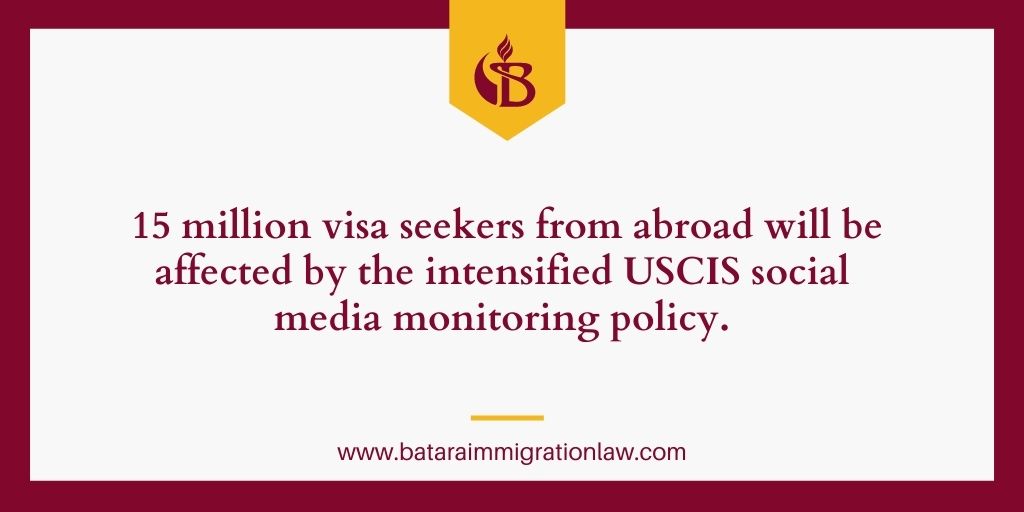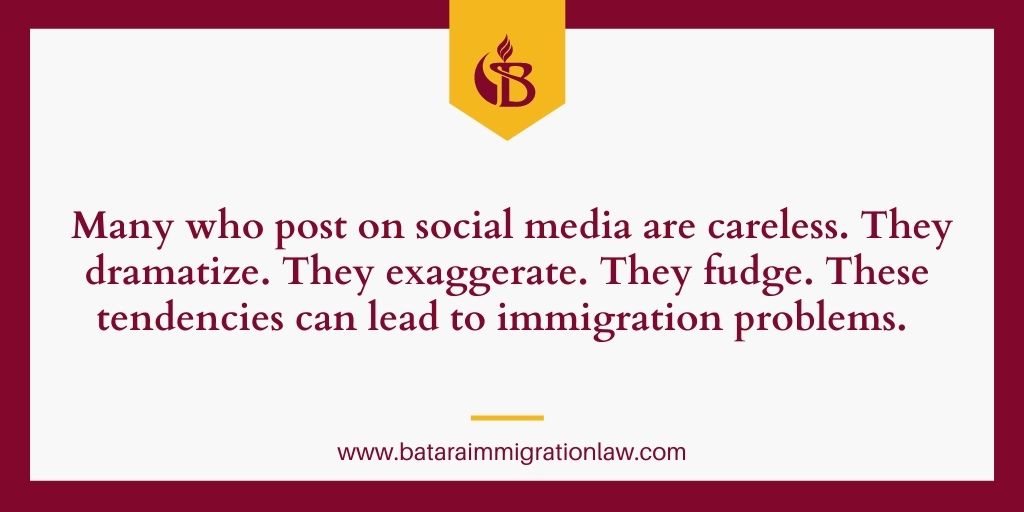
It’s your choice.
You can engage in social media discussions responsibly.
Or you can share whatever images of yourself that you fancy.
Just be aware others are paying attention.
Some may be immigration officers.
Why Should Immigrants In Bona Fide Relationships And Marriages Worry About Their Social Media Posts?
Fair question.
A few months ago, a woman named Josephine visited my Riverside immigration office.
She had been in a romantic relationship with Jesus for several years. She loved him. He loved her.
Facebook and Instagram memorialized the good times, family events, and social gatherings.
One day their relationship abruptly ended.
Josephine moved on.
She began to cautiously date again about two years later.
She met William, and after months of hanging out together, she fell in love again.
But this time, she was not willing to place her new reality into plain view.
Wounded by the past, she did not highlight her new beau on social media channels. Even after they married.
Hoping to spend their lives together, William filed a petition to sponsor Josephine for permanent resident status.
At her green card interview, the officer questioned William’s absence from her posts.
She lost on the basis of one of the most common marriage green mistakes. Insufficient evidence of a bona fide relationship.
The New USCIS Social Media Rules:
A Threat To Green Card Marriages
And Fiance Visa Applicants
These are two sides of the same USCIS regulatory coin.
On the one hand, immigrants who carelessly post too much can poison their green card applications long before filing for immigration benefits.
On the other, social media omissions can contaminate genuine permanent residence efforts based on legitimate marriages.
Sound unfair?
Sure.
But this is not a situation where you can fight fire with fire.
Better to focus on preventive social media practices – until and unless courts demolish the USCIS social media rules and policies.
- What applicants for green cards and fiancé visas are affected by the tightened government monitoring of social media accounts?
- How far back will immigration officials look at the postings of immigrants and their spouses (or fiancés) on Facebook, Twitter, Instagram, and other social media platforms?
- Why has the government decided to embark on actively monitoring the social media posts for green card benefits?
- How do comments, photographs, and videos posted by immigrants and their spouses (or fiancés) create problems obstacles to permanent residence success?
- What types of information is USCIS trying to uncover during its social media investigations?
What Marriage Green Card Applicants Are Affected By USCIS Social Media Rules?
According to government statements, 15 million visa seekers from abroad will be affected by the intensified USCIS social media monitoring policy.

Based on my experience as a permanent residence attorney, I believe the government estimate is inaccurate.
First, scouring social media sites is not new.
It’s been clear, in cases I’ve handled, the government has been looking at social media accounts of immigrants and their family members since at least 2010.
Questions have long arisen during marriage green card interviews (as well as fiance visa interviews) that would not have been raised unless some surreptitious research had taken place.
In addition, an invigorated push to uncover information from individuals’ postings was publicly proclaimed following the San Bernardino terrorist shootings in December 2015.
As I noted in an ABC interview shortly after the incident, questions regarding “How could someone seeking a K-1 fiance visa, given the couple’s backgrounds, slip through the cracks?” are not going to be easily answered by red-faced DHS and USCIS officials.
The result was predictable. Social media accounts were now, if not before, fair game for government investigation.
Second, the government’s recent announcement was limited to the review of social media accounts from visa applicants abroad.
But the true reach of the government’s efforts is far, far wider than just immigrants seeking benefits from abroad. To assume otherwise is to blindly assert government agents are only interested in the activities of persons not yet living on American soil.
How Far Back Will The Government Look At Immigrants Social Media Postings?
The government’s announcement stated that new forms are being created to address the new USCIS social media rules.
Generally, the government will ask for an applicant’s most previous five years of social media history.
This does not mean their review will be restricted to five years. Especially if investigators spot potential red flags, green card seekers should anticipate scrutiny going further back.
Here are some important points that immigrants should be aware of:
Filling out the forms completely will be mandatory. Filling out the forms truthfully will be mandatory.
Some individuals might think, “Well, I have some fake IDs. I have some aliases. How will they know those are my accounts?”
That is not a chance any immigrant should take. To deliberately conceal information being requested is material misrepresentation. Such fraud may well spawn a lifetime preclusion from permanent residence eligibility.
Take the USCIS social media rules seriously.
There are some individuals who do not have social media handles. Given the vast majority of persons use one form of social media or another, It is likely they will be pressed to prove their situation.
If these individuals tested social media waters in the past, but abandoned their efforts, they are still required to submit their former social media information to USCIS.
In short, the reality is this. You don’t want to hide information from the government.
Everyone could be investigated. It does not mean everyone will be investigated. I doubt such an enormous undertaking is possible – at least, not without bringing the processing of immigration petitions and applications to a screeching halt.
(Of course, I have no crystal ball and cannot foresee the future of artificial intelligence in such endeavors.)
I perceive that the review of immigrants social media accounts will undertaken on a two-track approach.
On the one hand, I assume the government will scrutinize applications in depth on a random basis, such as every fourth or fifth file.
On the other, if a red flag, a warning sign is discerned in an applicant’s paperwork, that particular application will be referred for further investigation, including a review of that person’s social media accounts.
These are only my suppositions. The government has not indicated how they will in fact handle the monitoring of immigrants’ social media accounts.
As a result, some commentators note this absence of regulatory guidance opens the door for the profiling of applicants from disfavored countries.
In light of this administration’s clear bias towards certain nations, this is a legitimate fear.
Both applicants and their representatives will need to keep a close watch on how the new USCIS social media rules are carried out in coming months.
Why Is The Government Monitoring Social Media Accounts Of Green Card Applicants?
Ostensibly, the government decision to inspect the social media accounts of immigrants is based on four purposes.
- First and foremost, as noted above, the social media requirement is to discern security and terrorist threats.
- Second, to ascertain good moral character shortcomings.
- Third, to weed out false vows of matrimonial bliss.
- Fourth, to prevent granting benefits to unqualified individuals.
Couples who recently married or are seeking a fiance visa need to be wary about how the latter three issues could affect the outcome of their cases.
Whether applicants who have applied for a green cards is a good person, seek residence based on bona fide marriages, and deserve lawful status are ripe areas for screening the content of social media posts.
The Fundamental Cause Of Potential Social Media Problems For Immigrants
The basic problem is simple.
Plain and simple, many individuals who post on social media are careless.
They dramatize. They exaggerate. They fudge.
These tendencies can lead to immigration problems.

At interviews for fiance visas and green cards. At ports of entry for individuals seeking to enter the United States. At court for immigrants facing deportation charges.
When you post on social media channels, it’s like taking a microphone and broadcasting your words to the world. Your comments might be intended for just one person, but they are open to review and interpretation by others. Like immigration officials.
Moreover, the person to whom your message is intended may understand its context. But USCIS agents, in most cases, will not. They will only see it in a small window, devoid of its full meaning.
And these narrow snapshots, especially for individuals who dramatize, exaggerate, or fudge the truth, could undermine your dreams of spending your life with a person you dearly live in the U.S.
Your posts may be shared to draw laughter. A government investigator may perceive them as harboring hostile, threatening, or criminal designs.
In other words, if you’re an immigrant seeking green card status, or you’re planning to petition your spouse for permanent residency benefits, being prudent with your use of social media is no longer optional.
When it comes to the issue of green card approval, avoiding a perception of falsehood by USCIS officers is crucial.
An Ounce Of Prevention: What Social Media Mistakes Should Marriage-Based Green Card And Fiance Visa Applicants Avoid?
So let’s take a closer look at the types of postings on platforms like Facebook, Instagram, Twitter, My Space, Vine, Reddit, Pinterest, Linked In, and You Tube where individuals applying for immigration benefits via marriage can cause trouble for themselves.
Potential stumbling blocks for immigrants seeking permanent residence through marriage or applying for fiance visas (and their spouses) are most likely to surface due to social media information about their couple status or good character.
Postings That Heighten Concerns About The Bona Fide Nature Of Relationships
Let’s say you’re an applicant for a fiance visa from abroad, a K-1 visa. On your social media handles, you list that you’re married. This will lead USCIS to question your eligibility for a K-1 visa because you have to be single.
The purpose of a fiance visa is to get married in the United States. If you’re already married, you’re disqualified.
The contrary could also destroy your efforts to lawfully immigrate in certain situations.
Perhaps you’re applying for a green card on the basis of marriage to a U.S. citizen. Yet, your social media accounts state that you’re single.
Maybe the listing is two years old. You simply have not changed it. Nonetheless, this could cause you a lot of anguish when you submit paperwork for permanent residence.
Do not assume the government will simply discount your listed single status as a matter of procrastination.
After all, why would you leave “single” there, when supposedly you’re married and someone is sponsoring you for a green card.
The same set of warning extend to U.S. citizen or permanent resident spouses. If their social media listings are flawed, this is also likely to create problems for their immigrant husbands or wives.
Such carelessness could lead to a lot of unnecessary questioning and difficulty proving to the government that you and your spouse have a bona fide relationship.

Postings That Heighten Concern About Criminal Actions And Good Moral Character
Individuals sometimes post about actions that have a criminal aspect to it. For instance, joking about driving home from parties or events drunk. Or boasting about how many mixed drinks they consume every weekend. This is not a self portrait you should paint for government social media inspectors.
Even the mere posting of pictures or images can heighten government suspicion of green card applicants.
Consider a spouse, be it the petitioner or the immigrant, who frequently shares pictures showing them with other individuals of the opposite sex. Likewise, live stream videos at social gatherings in which countless drinks are displayed with loud or obnoxious behavior.
Critics assert such possibilities place a “chilling effect” on individuals’ free speech rights to post as they see fit,
They’re right.
But in an age where immigration policy is being tightened, is the sacrifice to refrain from such postings too much to ask for immigration success?
Caution Warranted: Don’t Let Social Media Destroy Your Green Card Case
Even the postings of relatives or friends who tag you could lead to questioning by USCIS officers. You cannot control such listings.
However, you should be aware this may happen during the marriage green card process due to the intensified focus on social media accounts.
Like it or not, you have to be careful about your social media interactions. In this regard, common sense goes a long way.
Whenever you post on Facebook, Twitter, or elsewhere, be aware that government agents could be following you. Don’t post items that could provide them with a false image of who you really are.
You’ll minimize the suspicion of immigration fraud and likelihood of an undesirable outcome to your immigration hopes and dreams.
The end result?
A life with the love of your life.
By Carlos Batara, Immigration Law, Policy, And Politics




